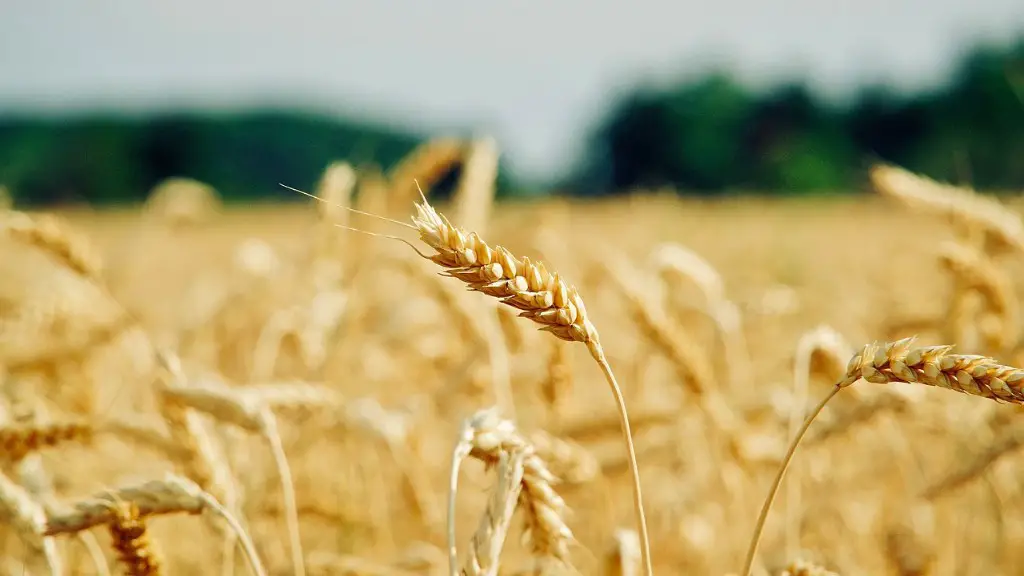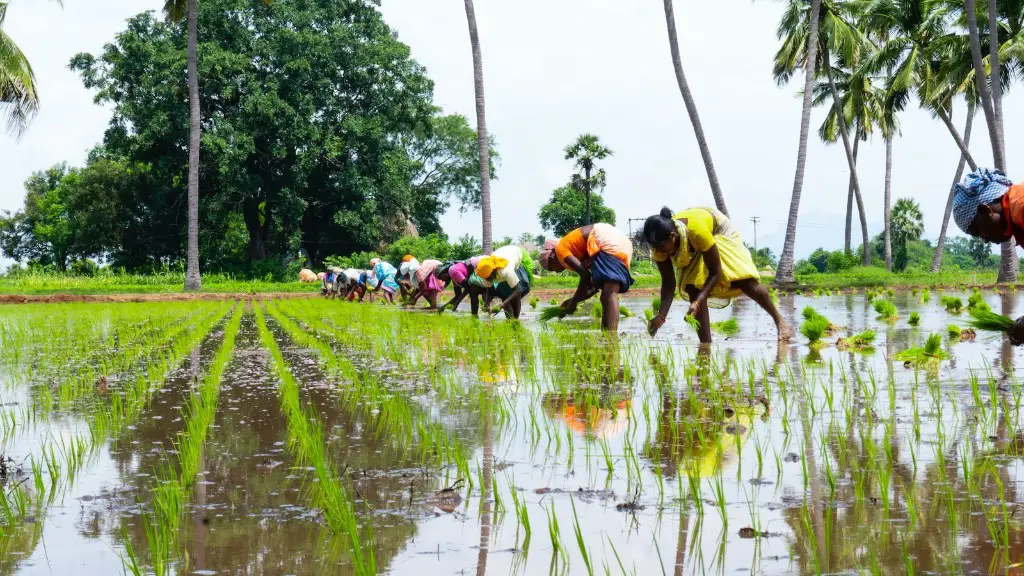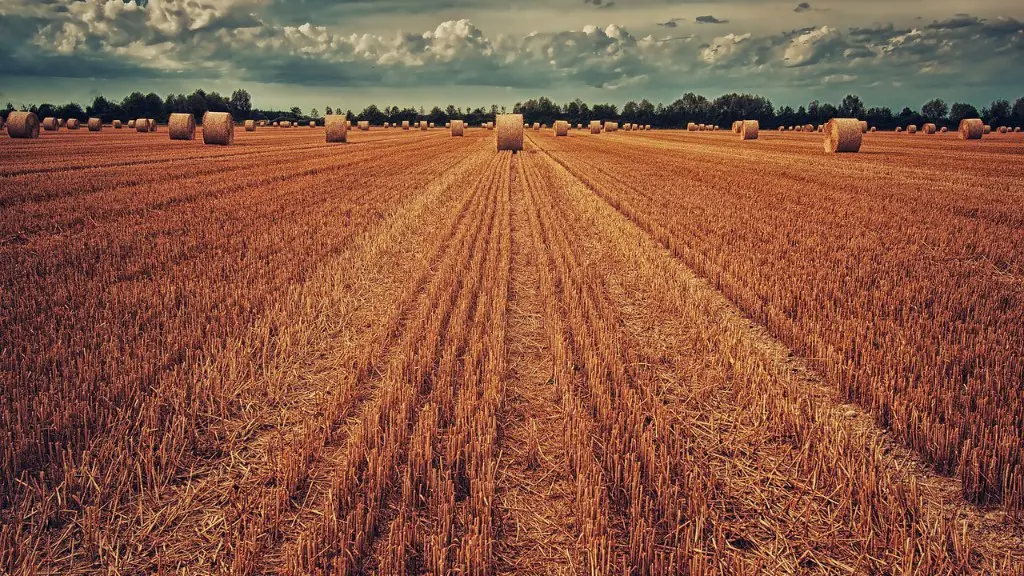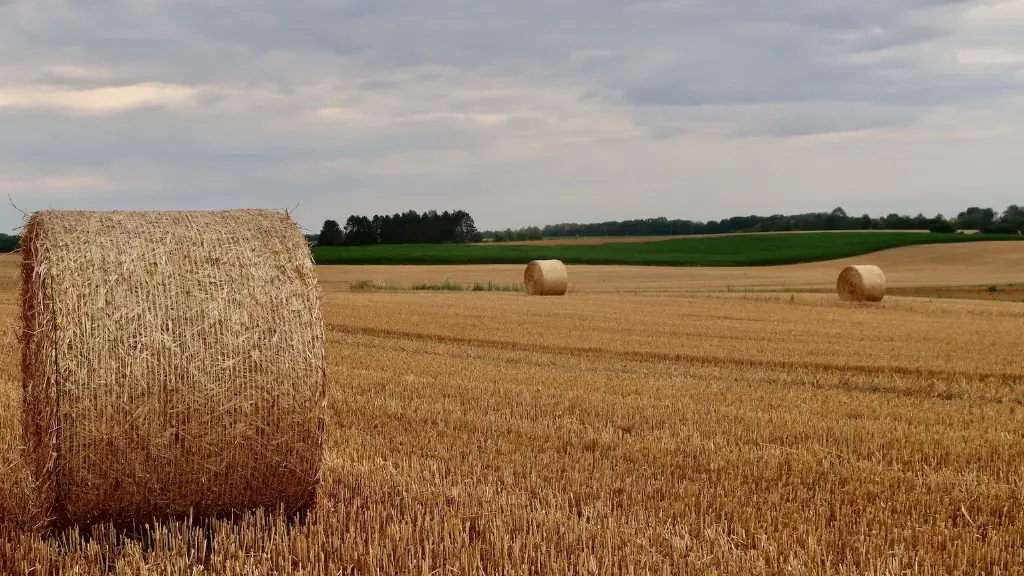Climate plays a vital role in regulating the agricultural production in Australia. As the weather continues to change, it affects the activity of crops, livestock, and ultimately, the productivity of farmers. Farmers in Australia have long been dependent on climate for their livelihoods and the current trend of global warming and irregular weather events is putting a significant strain on their livelihoods.
The impact of climate change on Australia’s agricultural sector can be seen in multiple facets. Rising temperatures result in reduced crop yields and changing rainfall patterns can cause water scarcity and less soil moisture. Further, erratic temperature patterns, extended periods of drought, and heatwaves can cause crop failure or pests and disease, consequently decreasing yield and losses in nutrients.
Australia is one of the most arid countries in the world and changing climate patterns have resulted in a decrease in rainfall in the past decades. This lack of rainfall is a major issue for farmers as it severely restricts their harvesting processes. As the water tables are dropping, farmers are required to bear hefty water bills to irrigate their crops. Thus, the costs associated with the access to water, is putting the burden onto the farmers, making it difficult to sustain their businesses.
Furthermore, climate change has brought a rise in extreme weather conditions such as heatwaves, floods and bushfires, which further adds to the difficulty of running a successful agricultural business. Heatwaves significantly disrupt the production process of farmers and put their livestock at risk. Floods can destroy the crops and render fields infertile, resulting in massive losses for the farmers. Similarly, extreme bushfires can cause immense damage to property and equipment and can be devastating for farmers and the agricultural sector.
Higher temperatures and extreme weather conditions necessitate the need for farmers to adopt new strategies and technologies to counter the impacts of climate change. For example, technologies for efficient irrigation management, water conservation, and precision agriculture, need to be introduced to reduce the stress caused by changing climate patterns. In addition, farmers must also diversify their crops to meet the demands of the varying climate, by selecting the crops which are more tolerant to the dry and warm weather.
Moreover, farmers must also shift towards more sustainable practices such as crop rotation and use of manure & compost to reduce the effects of climate change. Readjustment of their management strategies to a permanent form of agriculture, as well as improving their existing infrastructure, helps farmers to adjust to the current climate conditions.
Impact of Carbon Emissions on Agriculture
Climate and carbon emissions go hand in hand. Carbon emissions contribute to the rise of global temperature and heat stress on our planet. Farming in Australia is under considerable risk because of the effects of carbon emissions and the associated effects on weather patterns and the food supply. Higher temperatures and increased carbon emissions can increase the risk of crop failures due to pests and disease, and reduce soil fertility. Carbon emissions can also cause longer and more intense droughts, as well as more erratic rainfall, impacting the crop yields and the productivity of farmers.
As global temperatures continue to rise, the effect of such changes on the Australian agricultural industry is becoming more evident. Along with unpredictable growing seasons, erratic rainfall and prolonged drought, farmers are facing a decrease in yield due to high temperatures, and the vegetation is at risk. The quality of soil in many regions is also beginning to suffer due to excessive farming practices and lack of adequate water resources. In addition to this, farmers are also facing increased costs due to their dependence on supplementary water sources which are expensive and unreliable.
Australia has seen a large decrease in its fresh water resources over the last decade. This decreased water availability is further threatened by rapidly increasing global temperatures and unpredictable weather patterns. Australia’s farmers are in a difficult situation, as they are facing continued water shortages, along with elevated costs and unreliable markets. Farmers are becoming increasingly discouraged, as traditional strategies become less viable in the ever-evolving climate.
The impact of carbon emissions on Australia’s agricultural productivity does not stop at the product supply level. It also affects the agricultural sector in regards to the loss of biodiversity, and the degradation of soil health. Australian flora and fauna, as well as soils, are slowly degrading due to the rise in temperature and the presence of nitrogen in the air. Although carbon emissions have a direct effect on the climate and adversely affect the agricultural sector, finding solutions to reverse these effects is not impossible.
Suggested Solutions to Counter Climate Change in Australia
Government bodies, including the Australian Department of Agriculture, Water and the Environment, are working together to combat the impact of climate change on the agricultural industry. One of the suggested strategies is to limit carbon emissions, while also investing in more efficient irrigation technologies, and creating extensive fodder reserves. Such interventions enable farmers to remain resilient and ensure continuous production.
For instance, the Australian government has mandated a carbon offset program to reduce its greenhouse gas emissions. Additionally, public sector water projects are being developed and implemented throughout the country, allowing for increased access to water resources for farmers. These include efficient water management systems for irrigation, as well as rainwater harvesting and desalination of water from the sea.
In terms of technological solutions, precision agriculture has really come to the forefront. Precision agriculture enables farmers to take advantage of satellite and drone data, as well as artificial intelligence, to monitor growth and detect weeds, pests, and other diseases more accurately and at a faster rate. This will enable the farmers to quickly act and prevent any damage caused by the changing climate.
The development of efficient irrigation systems such as trickle irrigation can also benefit the agricultural sector. Not only does it reduce water wastage, but it also improves the number of yields, since this technology provides slow, longer-lasting water application, which allows plants to absorb water better.
Another suggestion for farmers is to shift towards more sustainable agricultural practices, such as crop rotation, using organic fertilizers, and working with renewable energy sources. Such sustainable practices produce healthier produce, reduce the environmental impact of agricultural activities, and help the farmers become more resilient in the face of climate change.
Government-Led Initiatives to Counter Climate Change
The Federal government of Australia has set up various initiatives and projects to help farmers counter the processes of climate change. For instance, the Farm Management Funds provide financial support to help farmers manage their businesses, as well as aiming to establish more sustainable agricultural practices. Additionally, the Sustainable Agriculture Initiative (SAI) encourages the development of improved farming practices, including more efficient use of nutrients, water and biological resources, while preserving the environment.
Funds such as the Regional Investment Corporation, provide financial assistance to farmers in rural areas and allow them access to loans at competitive interest rates. Similarly, the Farm Household Allowance also provides financial aid to eligible farmers who are suffering from periods of hardship. Such government-led schemes have helped numerous farmers across the country, and have instilled hope of providing continuous support for the future.
The government of Australia is also supporting farmers to consider shifting to new and innovative alternative practices, such as controlled-environment agriculture (CEA) & vertical farming. Such technology-based farming practices can help reduce water usage, reduce threats from pests & diseases, and increase production yield.
Apart from this, the government is also working on developing an extensive range of climate-resilient varieties of crops and livestock that can withstand the various impacts of climate change. This ensures that such new varieties can resist heat and drought, and are capable of producing more yields despite the conditions.
Educational Programs For Farmers in Australia
In order to enable farmers to gain a better understanding of the state of climate change and how to handle the various issues associated with it, various educational programs have been implemented. Such initiatives provide guidance on how to use climate-smart practices, such as precision agriculture and integrated management of pests, to optimize farming outcomes.
The government has also launched programs such as the Future Farming program, which focuses on providing educational resources to farmers on climate-smart farming practices. This program offers access to educational material and support services to help farmers understand the effects of climate change and gain practical knowledge of efficient and sustainable agricultural strategies.
Modernizing the agricultural sector through quality education is the key to ensuring that Australian farmers can stay ahead of the impacts of climate change. Universities, such as the University of Melbourne and the University of Sydney, are launching various degrees and certificates in sustainable agriculture and earth sciences, to help educate the next generation of farmers and equip them with the right knowledge and skills.
In addition to this, organizations such as the Climate Council, are releasing enlightening research reports and educational videos to inform people and educate them on the current situation and how they can do their part to reverse the effects of climate change.





